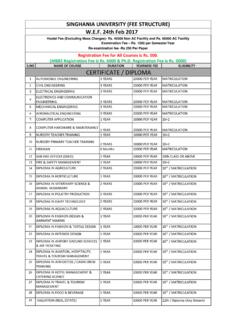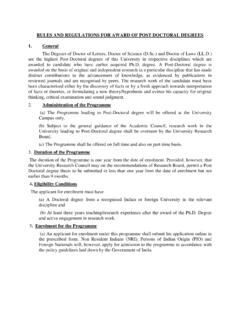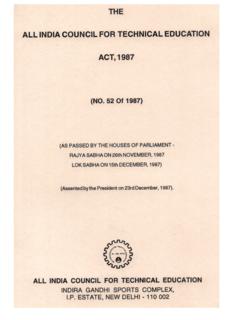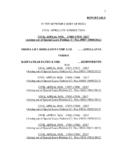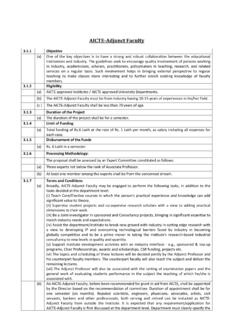Transcription of Approval by AICTE - Singhania University
1 Approval by AICTEAs per law, Universities do not require AICTE Approval . Only institutionswhich are affiliated to Universities require Approval . AsSinghaniaUniversity is a Self-FinancedUniversity established by a State Act, it doesnot require AICTE Approval . This standing of law is notified in the case ofBharathidasan University Vs of the relevant judgmentisgiven SUPREME COURT OF INDIAPage 1 of 9 CASE NO.:Appeal (civil) 2056 of 1999 PETITIONER:BHARATHIDASAN University & ANR. :ALL INDIA COUNCIL FOR TECHNICAL EDUCATION & OF JUDGMENT: 24/09/2001 BENCH:S. Rajendra Babu & Doraiswamy :Raju, J. The only and important question of law that arises forconsideration in this appeal is as to whether the appellant-Universitycreated under the Bharathidasan University Act, 1981 [hereinafterreferred to as the University Act] having its area of operation overthe Districts of Tiruchirappalli, Thanjavur and Pudukkottai in the Stateof Tamil Nadu, should seek prior Approval of the All India Council forthe Technical Education [hereinafter referred to as AICTE ] to start adepartment for imparting a course or programme in technicaleducation or a technical institution as an adjunct to the Universityitself to conduct technical courses of its choice and selection.
2 The Bharathidasan University Act, 1981 created the Universityin question to provide, among other things, for instruction and trainingin such branches of learning as it may determine; to provide forresearch and for the advancement and dissemination of knowledge;to institute degrees, titles, diplomas and other academic distinctions;to hold examinations and to confer degrees, titles, diplomas and otheracademic distinctions on persons who have pursued an approvedcourse of study in a University college or laboratory or in an affiliatedor approved college and have passed the prescribed examinations ofthe University ; to confer honorary degrees or other academicdistinction under conditions prescribed; and to institute, maintain andmanage institutes of research, University colleges and laboratories,libraries, museums and other institutions necessary to carry out theobjects of the University , etc.
3 In other words, it is a full-fledgedUniversity recognized by the University Grants Commission also. When the appellant- University commenced courses intechnology such as Information Technology & Management, Bio-Engineering & Technology, Petrochemical Engineering &Technology, Pharmaceutical Engineering and Technology, etc., theAICTE filed a Writ Petition of 1998 before the Madras HighCourt seeking for a writ of mandamus to forebear the Universityauthorities from running/conducting any courses and programmes inthose technical courses. The sum and substance of the grievance aswell as the objection put forward was that the University did not applyfor and secure the prior Approval for those courses before theircommencement by the University as envisaged under the All SUPREME COURT OF INDIAPage 2 of 9 Council for Technical Education Act, 1987 [hereinafter referred to asthe AICTE Act] and the statutory regulations made thereunder bythe AICTE , particularly Regulation , which obligated even anUniversity to obtain such prior Approval .
4 The stand of the appellant- University was, as it is now before us, that the appellant-Universitywill not fall under the definition of Technical Institution as definedunder Section 2(h) of the AICTE Act and consequently, theregulations made for seeking prior Approval of the AICTE even by theUniversities to commence a course or programme in technicaleducation or a new department for the purpose, were in excess of theregulation-making powers of the AICTE and consequently, are nulland void and cannot be enforced against the appellant- University tothe extent it obligates even Universities to seek and secure such priorapproval from the AICTE . The learned Single Judge has chosen to accept the stand ofthe AICTE by applying and following the ratio of the decision of a FullBench of the Andhra Pradesh High Court reported in M.
5 SambasivaRao alias Sambaiah & Ors. Vs. Osmania University , Hyderabadrep. By its Registrar & Ors. [1997(1) Andhra Law Times 629] andas a consequence thereof, ordered the cancellation of the admissionsmade by the University . When the matter was pursued before aDivision Bench, the learned Judges in the Division Bench also feltconvinced of the ratio laid down by the Full Bench of the AndhraPradesh High Court and rejected the appeal, necessitating theappellant- University to come to this Court. Since the approachadopted by the learned Single Judge and the Division Bench are onthe same lines as the one adopted by the Full Bench of the AndhraPradesh High Court, which the Madras High Court has also purportedto follow, it would be just and necessary to refer to the said decisionand also consider the correctness or otherwise of the ratio in the saiddecision.
6 In M. Sambasiva Rao (supra), while adverting to the relevantprovisions of the University Grants Commission Act, 1956, theAndhra Pradesh State Council for Higher Education Act, the Act, 1991, the AICTE Act and the All India Council forTechnical Education (Grant of Approval for starting new TechnicalInstitutions, introduction of courses or programmes and Approval ofintake capacity of seats for the courses or programmes) Regulations,1994 [hereinafter referred to as the Regulations], the High Courtarrived at a conclusion that the AICTE Act being a special law on aparticular category of education, overrides even the University GrantsCommission Act, which, in the opinion of the High Court, was in thenature of a general law in regard to imparting of education byUniversities in general in respect of common matters coveredthereunder.
7 In spite of both the Acts being those made by theParliament within its legislative competence even as later law, theAICTE Act was held to be binding. As for the relative operation of theAICTE Act and the State Act dealt with therein, it was held that theAICTE Act occupied the field and that, therefore, the State Act has toyield and consequently statutory regulations made are not only validand had the force of law as a subordinate legislation, but no questionof repugnancy between the Regulations and AICTE Act or anyalleged excess exercise of power in framing such regulations, aroseon the facts of the case having regard to the creation of the AICTE forthe proper planning and coordinated development of technicaleducation system throughout the country. The Andhra Pradesh HighCourt was of the view that anybody or everyone of the authorities andinstitutions concerned with a technical education all over the countrywould fall within the meaning of Technical Institution as defined inSection 2(h) of the AICTE Act and, therefore, be bound by theauthority of the AICTE under the AICTE Act and the Regulationsmade thereunder.
8 In coming to such conclusions, the Full Benchtried to draw sustenance from the decisions of this Court reported SUPREME COURT OF INDIAPage 3 of 9 Unni Krishnan Vs. State of [1993(1) SCC 645] and Stateof Tamil Nadu Vs. Adhiyaman Educational and ResearchInstitute and Ors. [1995(4) SCC 104]. Shri Shanti Bhushan, learned senior counsel appearing for theappellant- University , urged that a University like the appellant asdefined under Section 2 (i) will not fall within the definition of atechnical institution contained in Section 2 (h) of the AICTE Act and,therefore, equally stood outside the purview of Section 10 (1) (k) ofthe said Act and consequently not obliged to seek for and obtain theprior Approval of the AICTE for starting a department or introducingnew courses or programmers. The regulations framed by the AICTEfor the same reason insofar as it obligates even universities to obtainsuch prior Approval , cannot be held to be binding or enforceableagainst the appellant by the mere fact that the regulation specificallystates so, notwithstanding the provisions contained in the Actstipulating to the contrary and any regulation so made will be voidand unenforceable.
9 It was also urged that the decision of the FullBench of the Andhra Pradesh High Court does not lay down thecorrect position of law and the decisions of this Court relied upon inthe said decision really do not lend any support to the principlesultimately laid down therein and, therefore, the Madras High Courtought to have considered the issues independently and not followedthe ratio of the Full Bench in M. Sambasiva Raos case (supra). Thestrong grievance ventilated on behalf of the appellant is that both theAndhra Pradesh and Madras High Courts have failed to properlyconstrue the relevant provisions of the Act, applying the correctprinciples of interpretation and also giving due consideration andweight to the various stipulations contained in Section 10 which madespecific reference wherever the universities also have to adhere tothe provisions of the AICTE Act, Rules and Regulations.
10 It was alsourged that no Rules or Regulations inconsistent with the provisions ofthe Act could have been either made under the Act or sought to beenforced, legitimately. Strong reliance has also been placed on thedecisions reported in Singh & Others vs Giri & another(AIR 1970 SC 2097); Trivedi & Sons and others vs State ofGujarat and others (AIR 1986 SC 1323) as also the very decision inUnni Krishnan, and others vs State of Andhra Pradesh andothers [(1993) 1 SCC 645] and State of and another vsAdhiyaman Educational & Research Institute and others [(1995)4 SCC 104] and Medical Council of India vs State of Karnatakaand others [(1998) 6 SCC 131]. Dr. Verghese, learned counsel for the AICTE , whiledrawing sustenance from the reasoning of the judgment underchallenge as well as the Andhra Pradesh case, urged that havingregard to the overall functions and powers of the Council under theAct to ensure proper planning and coordinated development of thetechnical education system throughout the country, the qualitativeimprovement of such education and regulation and propermaintenance of norms and standards in the technical educationsystem and matters connected therewith envisaged under Section 10of the Act particularly Section 10 (1) (k) read with Section 20 (1) (b)


